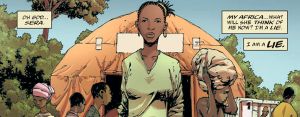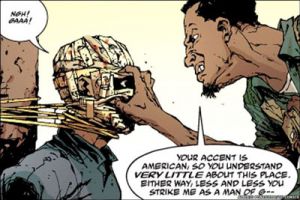Interviews
Unknown Soldier: The Dysart Interview Pt. 2
By Beth Davies-Stofka
February 24, 2011 - 11:46
Yesterday,
we began our multi-part interview with Joshua Dysart by introducing the context of his 2008 revival of
Unknown Soldier, and chatting with him about how the series came to be set in modern Uganda. Today we explore the character of Dr. Moses Lwanga, the new
Unknown Soldier.
CBB: Can we talk a little bit about Moses Lwanga? Why did you decide that he should be a doctor?
JD: That played into the whole notion of identity and place. What I desperately wanted was to take the two opposites of the pacifist/conflict argument and exploit them both. I wanted to kind of smash them together and cause conflict between them. And I thought it would be really interesting to do that with one single character. So knowing that he was going to turn into an incredibly proficient soldier and someone who was going to use conflict to his advantage, I thought that we should definitely start with a healer, and that’s how Moses became a doctor. He became the very antithesis of the Unknown Soldier character.
And is there a similar reason for having both Moses and Sera be American, or for them to have been raised in America so that having that dual identity…
Yeah, well I should state that this is a misconception about the book, and it’s been a large enough misconception that I now have to take responsibility, it must be my fault, but Sera is actually Ugandan, and in particular Bugandan, she is from one of the largest tribes in the south. I didn’t make that clear enough.
Moses, however, is American educated, and he’s also culturally American. And there are two reasons for that. The first reason was storyteller’s pragmatism. Once I got over to East Africa and began to interact with East Africans, I began to realize that it would be impossible for me to ever be able to tell a truly East African story. The cultural differences are so profound. Literally, we in the west are cognitively different in the way we view the world. And I could never breach that. And so I thought that one way to avoid a kind of narrative cultural colonialism would be to make Moses culturally American. And then from that, I could write him any way I wanted, because I’m culturally American. And then the second reason came after. Because I realized, well, now this is really interesting, because what Moses really wants to be is African, and he’s just not, you know, he just isn’t.
Did you intend any Biblical symbolism by naming him Moses? “Let my people go”?
I’m going to be completely honest with you on this. The name “Moses Lwanga” had become a place holder when I was working on the pitch. And I loved the name, it really rolled off the tongue beautifully, but I was really concerned about that very thing that you’re talking about. Like I thought, is this too on the nose? You know? I mean, I felt like this was a really obvious creative decision for me to name him this. I kept trying to change his name, and it just never got any better. So, I just finally acquiesced and let it be.
So it wasn’t a conscious attempt at the Biblical symbolism, and in fact, I would go so far as to say I tried to subvert the Biblical symbolism, but the name is just too phonically interesting, so I let it be.
In what ways did you try to subvert the symbolism?
Well, I think by now readers realize that he’s not going to lead the people out of captivity and into the Promised Land. He’s not going to pull this off. And so that’s part of it. But also just in the pitch process, I was so concerned that we were being too obvious with this name. I kept trying to find a better name, but I just couldn’t.
Next time, Dysart discusses the sanity/insanity of war and Moses Lwanga, and the rest of us. See you tomorrow!
Last Updated: March 3, 2025 - 20:40


